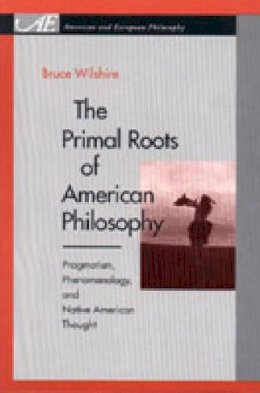
Stock image for illustration purposes only - book cover, edition or condition may vary.
The Primal Roots of American Philosophy: Pragmatism, Phenomenology, and Native American Thought (American and European Philosophy)
Bruce Wilshire
FREE Delivery in Ireland
Description for The Primal Roots of American Philosophy: Pragmatism, Phenomenology, and Native American Thought (American and European Philosophy)
paperback. Series: American & European Philosophy S. Num Pages: 232 pages. BIC Classification: 1KBB; HPC; JFSL9. Category: (P) Professional & Vocational; (UP) Postgraduate, Research & Scholarly; (UU) Undergraduate. Dimension: 229 x 152 x 20. Weight in Grams: 386.
Continuing his quest to bring American philosophy back to its roots, Bruce Wilshire connects the work of such thinkers as Thoreau, Emerson, Dewey, and James with Native American beliefs and practices. His search is not for exact parallels, but rather for fundamental affinities between the equally "organismic" thought systems of indigenous peoples and classic American philosophers.
Wilshire gives particular emphasis to the affinities between Black Elk’s view of the hoop of the world and Emerson’s notion of horizon, and also between a shaman’s healing practices and James’s ideas of pure experience, willingness to believe, and a pluralistic universe. As these connections ... Read morecome into focus, the book shows how European phenomenology was inspired and influenced by the classic American philosophers, whose own work reveals the inspiration and influence of indigenous thought.
Wilshire’s book also reveals how artificial are the walls that separate the sciences and the humanities in academia, and that separate Continental from Anglo-American thought within the single discipline of philosophy.
Show Less
Product Details
Publisher
Pennsylvania State University Press United States
Series
American & European Philosophy S.
Place of Publication
Pennsylvania, United States
Shipping Time
Usually ships in 15 to 20 working days
About Bruce Wilshire
Bruce Wilshire is Professor of Philosophy at Rutgers University. Recent books include The Moral Collapse of The University: Professionalism, Purity, and Alienation (1990) and Wild Hunger: The Primal Roots of Modern Addictions (1998).
Reviews for The Primal Roots of American Philosophy: Pragmatism, Phenomenology, and Native American Thought (American and European Philosophy)
“Bruce Wilshire is an original. His perceptiveness and his passion combine in his writings to create a magical world of present grief and future possibility. This new book is a unique amalgam of scholarly reflection, private soliloquy, emotional release, and spiritual self-cleansing—a prayer offered up to what Wilshire calls ‘the female archetype of a decentralized, pluralistic, and noncontrolling ground of ... Read morebeing.’ Contrary to much dull philosophy, these essays are written for the human voice; for full impact, they need to be spoken as the eyes take them in. . . . This is a very good book, though by no means what is nowadays considered a standard work in philosophy. I consider that a strength and not a failing, for it sets an exhilarating paradigm for what philosophers can do. Wilshire appeals to experience, not only argument; to feeling, not only reason; to insight, not only discursive understanding. He requires that in reading his work we do what he recommends and place ourselves in contact with the healing energies of a deeper universe.” —John Lachs, Vanderbilt University “In this book, Bruce Wilshire continues on a fearless path beyond traditional philosophical abstractions and what passes for ‘common sense’ in our culture, opening up new vistas on reality and the renewal of the spirit. He guides the reader step by step toward a new vision of existence that resonates with what he calls ‘primal philosophy,’ the mythic, and modern physics.” —Glen A. Mazis Parabola “Wilshire celebrates the heart of a revived American philosophical tradition construed as marking a way of life, a healing reabsorption in what Emerson called the ‘always circular power returning into itself.’ Philosophy as a path of wisdom, a way of life, links up to ‘existential’ ways of marking time and timelessness, of finding ecstatic experience, of finding one’s way with others. It aims to ‘re-enchant’ a distinctly ‘disenchanted’ world. . . . American philosophy and culture may not reform itself tomorrow, but it is not absurd to find hope for such reform in Wilshire’s book. In these straited times, it breathes fresh air into our lungs.” —Edward F. Mooney Journal of Speculative Philosophy Show Less

